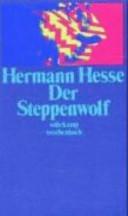
“A man cannot live intensely except at the cost of the self”
Steppenwolf (1927)

Steppenwolf is the tenth novel by German-Swiss author Hermann Hesse.
“A man cannot live intensely except at the cost of the self”
Steppenwolf (1927)
“No, I'm not religious I'm sorry to say. There is no time now to be religious.”
Steppenwolf (1927)
Steppenwolf (1927)
Context: “It is not a good thing when man overstrains his reason and tries to reduce to rational order matters that are no susceptible of rational treatment. Then there are ideals such as those of the Americans or Bolsheviks. Both are extraordinarily rational, and both lead to a frightful oppression and impoverishment of life, because they simplify it so crudely. The likeness of man, once a high ideal, is in process of becoming a machinemade article. It is for madmen like us, perhaps, to ennoble it again.”
“One day I would be a better hand at the game. One day I would learn how to laugh.”
Source: Steppenwolf (1927), p. 218
Context: One day I would be a better hand at the game. One day I would learn how to laugh. Pablo was waiting for me, and Mozart too.
Source: Steppenwolf (1927), pp. 30-1
Context: I cannot understand nor share these joys, though they are within my reach, for which thousands of others strive. On the other hand, what happens to me in my rare hours of joy, what for me is bliss and life and ecstasy and exaltation, the world in general seeks at most in imagination; in life it finds it absurd. And in fact, if the world is right, if this music of the cafés, these mass enjoyments and these Americanised men who are pleased with so little are right, then I am wrong, I am crazy. I am in truth the Steppenwolf that I often call myself; that beast astray who finds neither home nor joy nor nourishment in a world that is strange and incomprehensible to him.
“A mere nothing suffices — and the lightning strikes.”
Source: Steppenwolf (1927), p. 56
Context: A thousand such possibilities await him. His fate brings them on, leaving him no choice; for those outside of the bourgeoisie live in the atmosphere of these magic possibilities. A mere nothing suffices — and the lightning strikes.
“Eternity is a mere moment, just long enough for a joke.”
Source: Steppenwolf (1927), p. 97
Context: You should not take old people who are already dead seriously. It does them injustice. We immortals do not like things to be taken seriously. We like joking. Seriousness, young man, is an accident of time. It consists, I don't mind telling you in confidence, in putting too high a value on time. I, too, once put too high a value on time. For that reason I wished to be a hundred years old. In eternity, however, there is no time, you see. Eternity is a mere moment, just long enough for a joke.
“There are a great many suicides to which this thought imparts a common strength.”
Steppenwolf (1927)
Context: He gained strength through familiarity with the thought that the emergency exit stood always open and became curious, too, to taste his suffering to the dregs. If it went too badly with him he could feel sometimes with a grim malicious pleasure: “I am curious to see all the same just how much man can endure. If the limit of what is bearable is reached, I have only to open the door to escape.” There are a great many suicides to which this thought imparts a common strength.